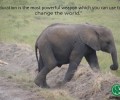Life at Camp Phoenix, Zambia
Welcome guest blogger Lauri Schelle who recently spent time at the GRI Elephant Orphanage in Zambia. All pictures are shared by permission, copyright Laurie Schelle and are not for reuse. Have you been to Africa and have a story you’d like to share with us? We always welcome guest blogs! Please contact us here.
My visit to Camp Phoenix was part of a three week whirlwind trip to South Africa and Kafue National Park, Zambia to reconnect with my African family, both human and elephant, after an absence of almost two years. My dear friend and colleague Lisa Olivier and her husband Theo now call Camp Phoenix home.
Theo is the funny, crazy Afrikaans-snake-whispering-fix-everything camp manager. Lisa is the brilliant, passionate and head-strong Brit who has been studying elephants since 2007 and has her MSc in Animal Behaviour, carries out vital behavioural observations on the elephants and coordinates the Elephant Orphan Project (EOP) volunteers.
I arrive at Camp mere months after a devastating storm had flooded the facility to the point that the elephants had to be evacuated and moved to safety while the camp was invaded not only by the rising water from the river, but by the crocodiles who call that river home. While Theo and his team have worked tirelessly to repair damages, a lack of available resources means some buildings have been abandoned while others stand in a state of disrepair waiting for thatch on order for roofs to grow and roads to become passable enough to allow workers and supplies to arrive. Meanwhile, mud walls have been washed away leaving nothing but wire mesh and wood support beams, exposing staff to an increased risk of discovering unsavory wildlife at their feet, such as a spitting cobra, or god forbid, a black mamba.
Life at Camp ebbs and flows with the rising and setting of the sun. While access to solar power is available, it is limited and electricity is used only to power essentials. Toilet facilities are open air, cooking is performed on propane stoves or by campfire and the only refrigeration on site is the staff deep freeze, which, depending on the time of year, level of heat and whether or not the gas runs out, is sometimes a freezer and other times a fridge. Life is basic, but there exists a strange beauty in the simplicity of it all. Flush toilets are a surprising luxury and showering outside under the shade of a giant Acacia tree with water heated by firewood easily makes the list of top ten showers in my lifetime.
Days begin early with staff gathering outside the boma for their morning meeting. Standard protocol at Camp is that, other than staff, only volunteers are permitted to walk out with the elephants. So on this particular morning after months of advance planning and special permission, I have been given access to view the project through the eyes of the volunteers. Before entering the elephant’s space, like all staff, we are required to wear the signature long green jackets the elephants familiarize with their humans. Doing so ensures we become a part of their environment; they aren’t concerned by us, nor are they curious about us and as such, go about their day in as natural a state as possible.
On this morning, Chamilandu, returning from an all night outing with Chodoba, waits outside the fence to greet the elephants as they leave camp. The decision of where to spend their day is entirely theirs, while we simply tag along behind them to their chosen destination. For those of us who are not keepers, an allowable route has been pre-determined, and as long as the elephants choose to graze and browse within this space, we are free to observe them.
Not long after we leave the safety of camp, they move beyond the invisible barrier cutting our walk short. Though I am disappointed to see them go, I am grateful to be here in the Zambian bush cocooned in soft warm light of a sunny winter morning, watching these beautiful little creatures, who have overcome so much fear, pain and terror, grow stronger and freer by the day.
As the herd moves out of sight, a scout appears to accompany us back to camp. Along the way we come upon the other orphan at camp, Shana, a gorgeous, sweet baby Cape buffalo. She is caramel coloured with huge funny ears and a scruffy bare spot atop her head where her horns are coming in. She had been grazing in the long grass outside camp, with her keeper watching over her from the shade of a nearby tree when we stop. She approaches us cautiously; tail flicking in excitement looking for an opportunity to suck on a forbidden finger or perhaps rub her itchy head on anything that will stand still long enough to allow her to do so. As she is of a species considered to be one of Africa’s most feared and unpredictable, this too is a rare privilege and yet another unique and beautiful experience to treasure.
At night, the elephants reside within the confines of a quaint little boma, which opens onto a large grazing area. The entire area is enclosed inside an impenetrable electric fence and guarded at night by an armed ZAWA (Zambian Wildlife Authority) scout. While the elephants are tucked away in the safety of their armed and electrified camp, the human residents are more exposed to the outside world, and while a second scout is also available for their safety and security, tracking him down for the purposes of a 20 meter walk from the kitchen to your tent at nightfall is both inconvenient and impractical.
And so it is that, like any environment one calls home, the staff adapt to life in the bush; senses become more heightened and small movements or uncommon silences are processed differently. While I lay in bed my final night, soaking up the night songs of the crickets, I hear the soft but very distinctive whomp of a leopard. As I drift off to sleep safely within the confines of my small canvas tent at the base of Mamba Mansion (Lisa and Theo’s safari tent perched atop a large termite mound), I make a mental note to ‘just hold it’ if I wake before day break and have to pee.
The Elephant Orphan Project is just one part of the Game Rangers International portfolio, which also encompasses conservation research, primate rehabilitation, anti trafficking, anti-poaching, wildlife veterinary medicine and community awareness, support and education. This is a tightly run organization run by local staff and expats who have exchanged the comforts of home for a meager salary and a basic lifestyle. It is rewarding and beautiful, yet it is also hard, heart breaking, all encompassing and at times thoroughly overwhelming.
The saying ‘it takes a village to raise a child’ can also be reversed and as such, the support of a child, or in this case a young orphan elephant can not only help ensure she and her fellow orphans receive the best chance in life, it can also raise, educate and nurture a village through the aide of a deserving organization in need of support.
Want to get involved with the Elephant Orphanage Project? Support Kavala with us! We are always looking for new re-occuring sponsors to help us care for her needs.







What a lovely insight to a fascinating lifestyle, both from an elephant perspective and human. I too would wait if I were spending a night in Mamba Mansions!